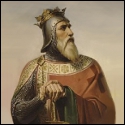|
Support Hussayn!
|
|
|
|

|
| # ? Apr 20, 2024 05:19 |
|
Tripolitania
|
|
|
|
AJ_Impy posted:Tripolitania. Why settle for half-measures when we can claim all of egypt over time? Because we're noble Sicilians and proper Christians, not petty land-grabbers. Besides, we don't want Egypt, or any of its lands. We only want the place to stop being ruled by a douche, and conquering Tripolitania ain't gonna change that.
|
|
|
|
Take Tripolitania, Egypt will not be easy and we don't want to disrupt any newly Siculo-Norman provinces or prevent new ones from forming. We can take Tripolitania easily and we can defend ourselves easily if the motherfucker ever tries to grab any land. In the meantime he'll create more Siculo-Normans for us to fold into a Sicily cemented by unity of culture.
|
|
|
|
State of the World (1200) The greatest hotbed of conflict in Europe is France, where, with the exception of the stubbornly independent Duchy of Dauphiné, four major powers continue to fight for influence in the shattered realm.  Clearly in the ascendant is the Kingdom of Aquitaine, whose rulers have recently proclaimed themselves Kings of Brittany as well. The inheritance of the realm by a young child leaves Aquitaine’s continued dominance in question, however.  England, on the other hand, is suffering from no such problems. King Robert II is among the most brilliant monarchs in Europe, and further expansion on the continent is not out of the question.  The King of France is a cunning man as well, but the incompetence of his ancestors means that he is in a difficult position if he wishes to recover the vast swathes of his kingdom that have been lost over the years. The fact that he is less powerful than his own vassal, the Duke of Champagne, is also problematic.  The final major power is the Holy Roman Emperor Lothar II himself. The son of the great Bernhard the Theologian, Lothar has nearly matched his father’s legacy, adding lands in Souther France and Northern Italy to the empire, though a coronation at the hands of the pope still eludes him.  In Spain, little has changed besides the movement of the Leonese court to Navarra. War between Christians and Muslims continues to be less common than intra-religious conflict.  In Scandinavia, on the other hand, there are three states clearly in ascendance.  The Danes have expanded into Wendish lands under the rule of King Hårik, but the old king has recently been deposed by his son Ernst.  Sweden has been even more successful, slowly incorporating pieces of the failing Norwegian kingdom into their realm in addition to continued campaigns in Finland and Karelia, all under the clever King Sverker.  Sweden’s main obstacle is the greatest pagan state left in Europe, that of Estonia. Led by a succession of excellent warlords, the Estonians have succeeded not only in holding off their Christian enemies but also in expanding their own realm significantly, uniting the Baltic pagans against the crusading Swedes and Poles.  In Russia and the steppes, things change little. Individual Rurikovich princes rise and fall, but few build anything that lasts. The Cumans, on the other hand, remain powerful yet stagnant. It would be a wonder if anything could change the status quo in Europe’s cold northeast.  To the south, the Byzantines and Turks are stalemated – or perhaps neither is interested in a long and costly war on the other side of the strait.  In Serbia-Lombardy, the d’Estes have been deposed by the brilliant yet mad Adalberto Boccanegra, the grandson of a Doge of Genoa.  The Greeks are ruled by the Empress Theophano – a rare example of a Byzantine empress regnant.  The Seljuk Sultanate of Rum is ruled by the competent yet unspectacular Mursel, who nevertheless remains perhaps the most powerful man in the world. It seems unlikely that anything could displace the Turks short of catastrophic internal collapse.  Even further south, Abyssinia expands down into the lands of the Jews of Semien even as they themselves are slowly pushed out of Nubia by the Egyptian crusader state.  Led by the great commander King Getachew, however, there is no telling what the great African realm will accomplish next.  On the other side of Africa, the many minor sub-Saharan states are beginning to consolidate. Especially notable is Takrur, a growing Muslim state along the coast, and one which may soon challenge the pagan Kingdom of Ghana for dominance.  Ledger Religions  The Most Prestigious Characters  The Most Pious Characters  The Largest States  The Largest Armies  World Map 
|
|
|
|
Could we get a dynasty map screenshot? I forgot just how many kingdoms the de Normandies had managed to take.
|
|
|
|
We should Crusade to Mecca  . .
|
|
|
|
Viscardus, do you think that we could get a religion map? Also a cultural map, if you can show one in the game.
|
|
|
|
Sure. Religions:  Cultures:  No labels, since I assume people can mostly figure them out. Feel free to ask questions, though. In that vein, I enjoy answering questions or providing extra screenshots if people ask. The only reason I don't include them in the updates is that I kind of consider them "non-canon" in that I've never completely liked how easy it is for religion to spread, and it's downright silly what can happen with culutures. I'll definitely be tweaking things significantly when we get to EU4 (the Netherlands won't be half German, for instance).
|
|
|
|
Does anyone know what effects changes in culture in CK2? Is it the direct owner of the province, or the highest liege, or surrounding cultures? I remember in my Count of Istria and Krain -> Duchy of Carinthia -> King of Lombardy game the entirety of northern Italy had turned Germany culture because I kicked the Italians out and replaced them with German counts, and had a German culture capital. Although Paradox makes sure to specify for their games that culture represents the most powerful culture in a province, not the most populous
|
|
|
|
I assume this means there's little point in keeping a Siculo-Norman ruler on the Egyptian throne? Because if there is we should just have the motherfucker and any vile brood assassinated.
|
|
|
Sindai posted:Could we get a dynasty map screenshot? I forgot just how many kingdoms the de Normandies had managed to take. Seconding this, if only to set goalposts for de Hauteville reunification somewhere down the line  Triskelli fucked around with this message at 03:47 on Aug 6, 2013 |
|
|
|
|
quote is not edit.
|
|
|
|
|
Sorry, missed the request for a dynasty map. Here you go:
|
|
|
|
An important question--if we supplant the ruler of Egypt, that will break the de Hauteville dynasty there, I'm assuming? Though at this point that line might be so tainted that it would be preferable.
|
|
|
Redeye Flight posted:An important question--if we supplant the ruler of Egypt, that will break the de Hauteville dynasty there, I'm assuming? Sort of. Hussayn is still a de Hauteville and quite closely related to the current king of Egypt, so it's really more of a matter of putting a different claimant of the same branch on the throne. Taking Tripolitania might weaken Egypt to the point that there's a civil war which topples de Hauteville rule but it's pretty unlikely.
|
|
|
|
|
Redeye Flight posted:An important question--if we supplant the ruler of Egypt, that will break the de Hauteville dynasty there, I'm assuming? Given that we are going to replace one Hauteville with another, no, it won't break the Hauteville dynasty.
|
|
|
|
It'd be preferable to replace him with someone of our own culture though, which could be done by assassination, if our King isn't too just and frugal in favor of his building projects to do that.
|
|
|
|
William is really not the type to assassinate anyone. And in any case, his main motivation for the war is to impress and win over his vassals. Just having King Turstin murdered probably wouldn't have the same effect (in fact, it might be counterproductive, given that assassination is rarely seen as a particularly noble act). Anyway, it looks like people are pretty much finished with voting, so the update will be up soon.
|
|
|
|
Chapter Nineteen: La Lingua Siciliana (1200-1207) With the approval of the Curia Regis, King William invites Hussayn to Sicily to plan their invasion.  It is only a few weeks later that Sicilian armies begin their trip to Egypt.  The war effort receives a crucial boon when King Guntard of Jerusalem agrees to join the war, as sick as the Sicilians are of Turstin and the Egyptians.  The first army to enter Egyptian territory marches across the North African border. Though Tripolitania is no longer a goal of the war, it still provides an appealing target.  The main armies sail for Jerusalem, where they can easily be supplied as they march on Egypt. The main army is led by Hussayn himself, a show of his martial skill meant to impress his would-be subjects.  The first and largest battle of the war occurs at Seyan, where Hussayn and Turstin meet in battle for the first time.  The battle is long and bloody, but the result is clear: Hussayn’s army is defeated and Turstin has drawn first blood.  While Hussayn retreats, however, a second Sicilian army arrives, engaging the Egyptians and protecting the pretender’s escape.  Led by Prince Bohemond, it is the Sicilians who triumph at the Second Battle of Seyan, virtually nullifying the previous Egyptian victory and putting Turstin on the defensive.  Before long the armies have reorganized, with Hussayn once again at the head of a large Sicilian force. The way cleared, he orders them to march on Cairo.  Before long, Cairo is under siege. Inadequate preparations by an overconfident King Turstin mean that starvation sets in quickly.  It is during the siege that Hussayn’s first son – and, if all goes well, future heir – is born.  Finally, the city falls – and with it, Egypt.  Turstin is forced to relinquish his crown, but keeps his extensive lands in Cyrenaica and Tripolitania.  Hussayn’s coronation leads to several changes within the Egyptian state. One of the most immediately visible is his use of the Arabic title “Sultan”.  Upon returning to Sicily, King William discovers that his wife, Queen Jutta, has passed away.  He also learns of the success of the Duke of Sardinia’s invasion of Corsica, capturing it from the Pisans.  Control of Corsica further cements Sicily’s place as the preeminent power in the Western Mediterranean.  The years after the Egyptian war are a turning point in the development of Sicilian language and culture. Ever since the days of Robert Guiscard and the first Norman invaders, the Norman ruling class has influenced and been influenced by the various peoples residing in Southern Italy. The result of this cultural melting pot is a Sicilian language used as an everyday language of communication by the various ethnic groups of Sicily. It is under King William II, however, that this language finally gains a significant degree of official recognition.  William is the first king to extensively use the Sicilian language at court, adopting the Sicilianized version of his name: “Guglielmo”.  He also encourages the use of the language for many administrative purposes, despite resistance from some in his court.  The fact that the language often acts as a lingua franca even among Arabic and Greek Sicilians helps to minimize communication difficulties caused by excessive need for translation.  In the midst of his efforts to reorganize the Sicilian administrative apparatus, the king receives interesting news: it seems that the husband of his lover Nehama has passed away.  Only a few weeks later, Nehama has been baptized, adopting the name Emma. It is a small price to pay.  And thus, despite the intense disapproval targeted at the king, he marries the newly-renamed Emma, making her the new consort of the Kingdom of Sicily. 
|
|
|
|
Daww they can be attractive and slothful together
|
|
|
|
Do Jewish converts to Christianity actually switch names in CK2+, or is that just you editing the save or somesuch?
|
|
|
|
I just edited the save for the sake of the story. By the way, I just want to get some feedback on something. Would you guys prefer if I continue referring to the king as William, or should I switch to Guglielmo? I figured I would keep calling him William for now, since it seems weird to start referring to him by a different name in the middle of his reign. On the other hand, if people think it's confusing to call him by a different name from the one he has in the game, I won't do that. It's not a major issue or anything; I just thought I'd check to see if anyone cares.
|
|
|
|
Start calling him Guglielmo, we didn't switch languages for nothing.
|
|
|
|
Googly Elmo sounds stupid anyway. Just use Anglicized versions of the names for all of them, forever.
|
|
|
|
The land and the king are one. As above, so below.
|
|
|
|
Just call him Elmo, the fussy king of Sicily.
|
|
|
|
Shouldn't he have been Guillaume in the first place anyway? I don't really care which you use 
|
|
|
|
RabidWeasel posted:Shouldn't he have been Guillaume in the first place anyway? I don't really care which you use He should have, but then England would have been conquered by Guillaume the Bastard, which would have confused English people. I'm pretty sure the Norman conquest of England is the entire reason Norman-culture characters have English-ish names.
|
|
|
|
Friend Commuter posted:He should have, but then England would have been conquered by Guillaume the Bastard, which would have confused English people. I'm pretty sure the Norman conquest of England is the entire reason Norman-culture characters have English-ish names. I'm not sure this is actually true, though I'd be interested in knowing for sure. Old Norman was distinct from the other Old French languages/dialects in several ways. I don't know exactly what "William" was in Old Norman, but apparently even today it isn't uncommon for words in Norman to begin with a W where they would begin with a G in Parisian French (e.g. "werre" instead of "guerre"), which is apparently a relic of Old Norman (and can be seen in the English word "war"). It seems plausible to me that the Old Norman form of "William" (which William the Bastard would presumably have called himself) might actually have sounded more like "William" than "Guillaume". This is just based on some quick internet research, though, so I might be wrong. If anyone knows more I'm be interested to hear it. In any case, the convention in English is to call the Norman rulers of Sicily (like most European rulers of the era) by the English versions of their names, so I stuck with that for the Norman culture rulers. Now that our rulers are going to be Sicilian culture, I will almost certainly call them by their Sicilian/Italian names unless people really prefer the English ones for some reason. I just thought it was worth asking what people preferred for the current William/Guglielmo. Also, on the off chance there is anyone as weirdly spergy about linguistics as I am (probably not), you might notice that it doesn't really make sense to be using Tuscan/Standard Italian to represent Sicilian. I briefly considered using actual Sicilian names, but ran into several problems: 1. The names look really weird to English speakers (Rubbertu, Buimunnu, Gugghiermu, etc.), 2. It's never really been a standardized written language, so there are inconsistent spellings and few resources on it, and 3. It still wouldn't really make sense because the influences that created modern Sicilian would be very different anyway (notably the lack of Catalan and Castilian influence). So basically, my story is that in this reality Sicilian just happens to evolve to look exactly like modern Standard Italian. And yes, I realize that no one else cares.
|
|
|
|
Viscardus posted:I'm not sure this is actually true, though I'd be interested in knowing for sure. Old Norman was distinct from the other Old French languages/dialects in several ways. I don't know exactly what "William" was in Old Norman, but apparently even today it isn't uncommon for words in Norman to begin with a W where they would begin with a G in Parisian French (e.g. "werre" instead of "guerre"), which is apparently a relic of Old Norman (and can be seen in the English word "war"). It seems plausible to me that the Old Norman form of "William" (which William the Bastard would presumably have called himself) might actually have sounded more like "William" than "Guillaume".
|
|
|
|
I played around with this very question in my Bulgaria LP and in the end I think it really depends on the storyt. For ease of reading using the Anglicized names is probably best until you get an outlier as that is usually the case for the histories. In my example, going from an Alexander (Aleksandr) to Asparukh, which doesn't quite have any real Anglicized version. I do find the melting pot cultures of southern Italy fascinating though, especially Malta which fell harder on the Arab, even Phoenician side of things linguistically. Still, considering the character of the Normans thus far, and the fact that English and French will probably dominate the sphere, and also because we're reading this alt-history fanfiction on an English language forum, I would go with English names. (Right here with you linguistic
|
|
|
|
Chapter Twenty: Out of the Orient (1208-1219) At the urging of his sons, King William authorizes a new military expedition in North Africa.  The king’s eldest two sons lead an army across the border to the Hammadid city of Bizerte.  The city falls relatively quickly, the Hammadid armies having exhausted themselves in a succession of civil wars.  The first real battle of the invasion comes later, when the Sicilian army moves further into the interior.  As expected, it is a Sicilian victory.  A second battle occurs upon the army’s return to Bizerte, where a second Hammadid army is attempting to retake the city. Once again, it is a decisive Sicilian victory.  Still recovering from their civil wars, the Hammadids surrender the city to Sicily.  An important port town, control of Bizerte means increased control over Trans-Saharan trade on its way to Europe, especially the crucial gold trade.  In recognition of his work capturing the city, Prince Roberto is named Count of Bizerte.  Roberto’s sister, meanwhile, is married off to the young King Bernat-Ezi of Aquitaine.  It is not much later that the first rumours reach Europe of a great horde of mounted warriors riding from the Asian steppes and conquering all in their path.  King William has more important things to worry about, however, like fashion trends at court in Palermo.  The rumours only increase over the next few years, however. Eventually word reaches Sicily that the hordes have appeared at the border of the Sultanate of Rum.  Though the true power of the Mongols is unknown, William is sceptical that they could defeat the mighty Turkish sultanate.  The Mongol ruler is rumoured to be an excellent general, but whether that will be enough to overcome the Turks is questionable.  Most of the Catholic world is far more concerned with a different group of pagans entirely: those remaining Baltic pagans, ever resistant to missionaries and crusaders alike. The Kingdom of Poland is attempting to overcome them through patronage of the Teutonic Order.  Having been granted most of the Polish border with the pagans, the order is in a strong position to both protect the Poles and conquer the pagans.  For his part, William is able to use the renewed feeling of martially-oriented religious fervour to get papal sanction for a holy war against the Hammadids.  In reality, of course, it is little more than an attempt at extending Sicilian control over Trans-Saharan trade. Rather than only controlling the ports, he desires to extend Sicilian control inland. 
|
|
|
|
He'll be remembered as Kind Elmo the Conqueror of Africa.
|
|
|
|
I'd say that you should have a little disclaimer at the beginning of every new king's reign (ex: "Guglielmo, known to the English as William"). That way, you could use the native names, while at the same time, you could point new or confused readers to the beginning of the king's reign in case they don't understand the Sicilian name.
|
|
|
|
Gygaxian posted:I'd say that you should have a little disclaimer at the beginning of every new king's reign (ex: "Guglielmo, known to the English as William"). That way, you could use the native names, while at the same time, you could point new or confused readers to the beginning of the king's reign in case they don't understand the Sicilian name. That's not a bad idea, actually. I did decide to continue calling William by his English/Norman name, just because I don't like suddenly switching halfway through his reign, but I expect that I'll be using the Sicilian names in the future. Adding a quick English translation is probably a good idea, if not always necessary (I'm sure everyone can figure out that "Robert" and "Roberto" are the same name).
|
|
|
|
paragon1 posted:He'll be remembered as Kind Elmo the Conqueror of Africa.  C is for conquest! C is for conquest!
|
|
|
|
Chapter Twenty-One: Primogeniture (1220-1224) Once again, Prince Roberto leads the first Sicilian army into Hammadid lands, laying siege to the city of Kairouan, long a centre of Islamic learning and culture until being largely destroyed almost two centuries ago.  Meanwhile, his brother Prince Guglielmo leads another army to cut off Hammadid reinforcements from Algeria.  Kairouan falls quickly, the Hammadid armies still no match for the Sicilians.  Without help from their Almoravid neighbours, the Hammadids seem doomed to lose territory to Sicily once again.  This is confirmed at the Battle of El Tarf, where the drastically outnumbered Hammadid army is annihilated.  But all is not lost for the Hammadids. The Sicilian commanders are soon shocked to find themselves fighting a large Almoravid army, sent east to assist their Muslim brethren.  But even that is not enough. The Almoravid army is defeated, leaving the Hammadid Sultan little choice but to cede land to the Sicilians once again.  Finally, the old dream of Guy of Benevento has been accomplished, and the Sicilian state has a direct link to the Trans-Saharan gold trade.  Bad news follows the good, however. King William’s son-in-law, the young King of Aquitaine, dies imprisoned by the Queen of England. Once again the Occitan kingdom is ruled by a child.  But there is even worse news. Prince Boemondo, William’s eldest son and chosen successor, has died of a sudden illness.  King William is distraught, not only at losing a beloved son but also at losing such a capable heir. With William’s health already starting to fail him, he knows it will not be long before he is gone.  The possibility of yet another succession war gnaws at William, especially if Boemondo’s young heir is forced to fight his uncles for his birthright, as William was in his youth. Though he knows it may not be enough, William decides to firmly enshrine in Sicilian inheritance law the principle of primogeniture – the inheritance of all land and titles by the eldest son – in an effort to reduce future succession wars.  Meanwhile, word from the East confirms William’s original suspicion – the Mongol horde has been soundly defeated by the Sultanate of Rum, though the Qarakhanids were not so lucky. It seems that the threat of the nomadic warriors has been overstated after all.  Then again, news of a second horde – or second arm of the first, no one is quite sure – entering Russia is still enough to worry the monarchs of Europe.  Once again, they are led by a capable young general, and the fractured Russian states are not quite as impressive as the great Turkish Sultanate – if the Mongols can first get past their Tengri brethren the Cumans, that is.  Regardless, it is not something for King William to worry about. He passes away in his sleep a few months later, leaving the Sicilian kingdom to his grandson Alessandro.  Alessandro, named by his Greek mother for the legendary Macedonian king, is a bright young man, albeit one whose intelligence is often directed to less-than-pleasant ends by his unfortunate personality. Often teased for his ugliness as a child, he has grown into a hostile, vicious young man with a fierce love of military matters.  Naturally, he is not well-received by his new vassals, even after his grandfather’s efforts to secure his claim to the throne.  Alessandro’s only brother and heir Leopoldo is named Duke of Calabria, the title their father had held before his untimely death.  Alessandro takes well to kingship, and suddenly the face that earned him mockery as a child no longer looks so unfortunate under a king’s crown.  Indeed, Alessandro quite enjoys his new status and power, caring little for the responsibilities of kingship but greatly for its benefits, much to the dismay of his vassals. 
|
|
|
|
So the newly captured territories in North Africa have trading posts, right? Which republic owns them?
|
|
|
|
|

|
| # ? Apr 20, 2024 05:19 |
|
Viscardus posted:I'm not sure this is actually true, though I'd be interested in knowing for sure. Old Norman was distinct from the other Old French languages/dialects in several ways. I don't know exactly what "William" was in Old Norman, but apparently even today it isn't uncommon for words in Norman to begin with a W where they would begin with a G in Parisian French (e.g. "werre" instead of "guerre"), which is apparently a relic of Old Norman (and can be seen in the English word "war"). It seems plausible to me that the Old Norman form of "William" (which William the Bastard would presumably have called himself) might actually have sounded more like "William" than "Guillaume". Also, wow, there's an event that turns you from "Ugly" to "Attractive"? Never knew.
|
|
|


























